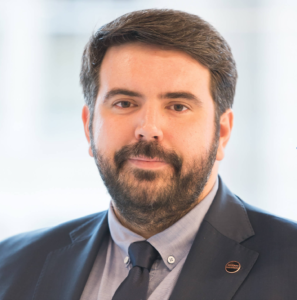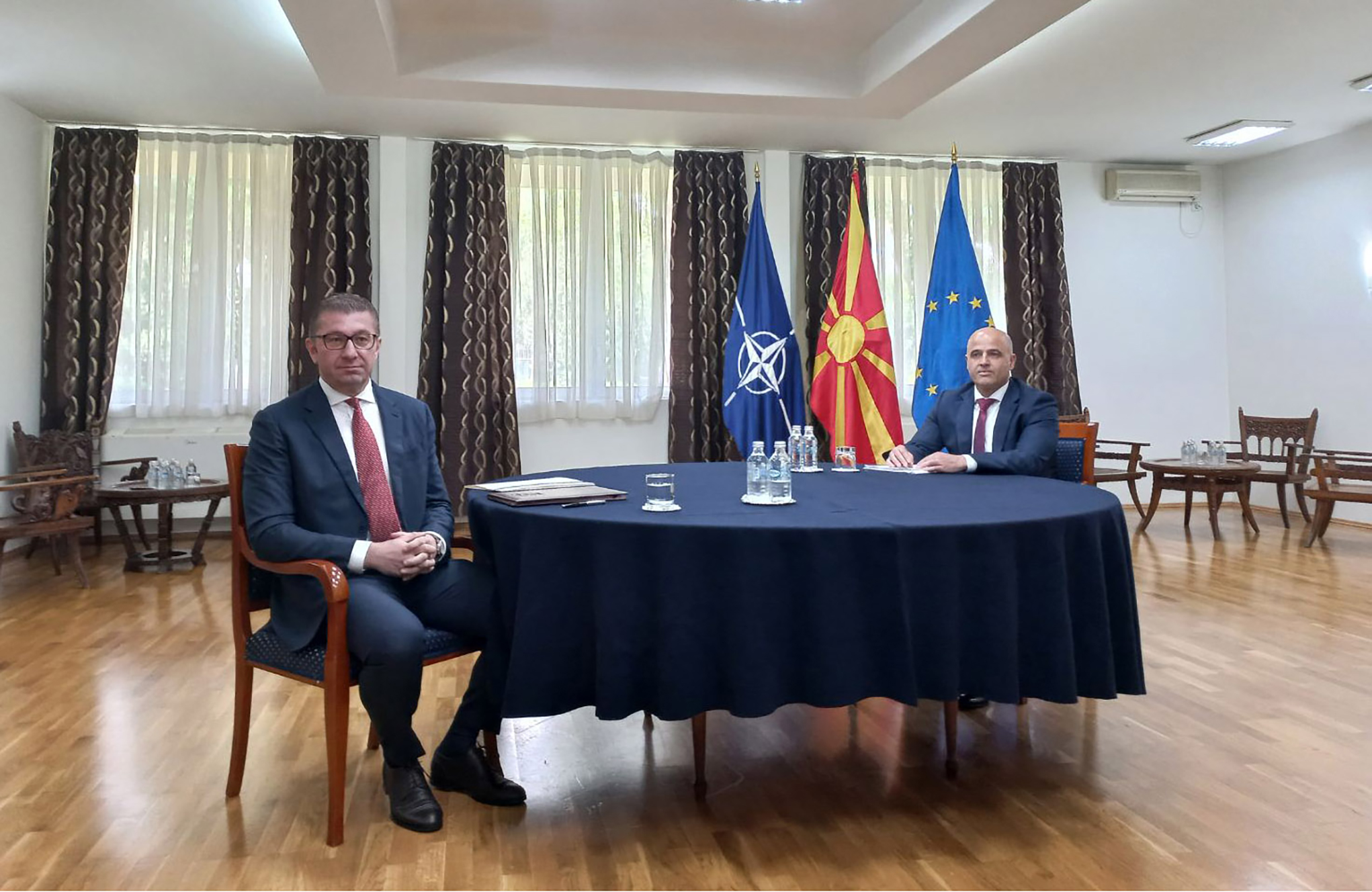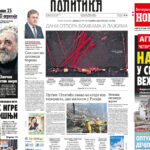Elections in North Macedonia often mirror the deep societal fissures and political strains that transcend the usual boundaries of political rivalry. The dominating themes in the political discourse are not merely economic issues or social policies but frequently touch upon matters of identity, national history, and international relations. The question of identity is particularly salient in this electoral campaign.
At the core of North Macedonia’s political arena stand two major parties: VMRO-DPMNE and SDSM. VMRO-DPMNE, traditionally wielding the card of national identity, capitalizes on the sense of grievance stemming from recent name changes of the state to mobilize its voters. The transition from “Macedonia” to “North Macedonia” as a component of the Prespa Agreement with Greece in 2018, despite facilitating the country’s progress towards EU and NATO integration, has left a bitter taste among a segment of the population who perceive it as a betrayal of national interests.
Conversely, SDSM frequently draws on a Macedonian future within European and transatlantic structures. Nonetheless, this party is not immune to criticism; many regard it as a part of the status quo, associated with corruption and inefficiency, leading to widespread political apathy among the electorate. This condition leads to a perception where voters are more often deciding “against” rather than “for” an option, reflecting a deep political polarization within the country.
VMRO-DPMNE also faces the challenge of balancing its nationalist discourse with realpolitik, especially concerning name and identity agreements with neighbors. Despite publicly denouncing these agreements, it is anticipated that should they ascend to power, they will need to find a way to honor them, or else risk further international isolation of the country.
Beyond Macedonian-Bulgarian and Macedonian-Greek relations, the internal dynamics between ethnic Macedonians and Albanians remain one of the key issues. Albanians constitute nearly a third of the population. The 2001 conflict, an ethnic clash between Macedonian security forces and Albanian insurgents, led to a greater political representation of the Albanian minority through the Democratic Union for Integration (DUI). Since then, DUI has been a constant presence in power, causing some to feel their influence is excessive and unfairly distributed, particularly in light of accusations of corruption and nepotism.
The conflict within the Albanian political scene is also visible, with minor factions breaking away from DUI and seeking their political space. This illustrates that North Macedonia’s political landscape is fragmented not only along ethnic lines but also within the ethnic groups themselves.
VMRO promises, for the first time, not to enter into a coalition with DUI, but instead to include the Albanian opposition in the government.
Furthermore, external influences play their role in Macedonian politics. Although Russian influence is not as prominent as in other parts of the Western Balkans, there is a certain level of support for Russia, especially when it comes to anti-Western rhetoric. On the other hand, ties with Serbia and the Serbian Orthodox Church shape a part of the political and social context, especially through VMRO-DPMNE, which sometimes employs Orthodox religious rhetoric to strengthen its nationalist narrative. Relations between the Serbian and Macedonian Orthodox Churches occasionally strained in the past, have recently shown signs of improvement, especially after agreeing on autonomy for the Macedonian church. Aleksandar Vučić invests heavily in the campaign in North Macedonia, hence his considerable popularity among Macedonians.
The DUI has sounded the alarm over potential post-election turmoil. On March 18, the party voiced concerns about possible riots following the May parliamentary elections, hinting at a “Russian scenario” that might be orchestrated between Albanian and Macedonian opposition parties, notably VMRO-DPMNE and Levica (the Left). Although specifics of this alleged scenario remain vague, DUI’s unease stems from what it perceives as a concerted effort by these opposition parties to destabilize the electoral process and stir political discord. The party accuses the opposition of maligning DUI’s presidential hopeful Bujar Osmani and interim Prime Minister Talat Xhaferi, furthering a narrative that plays into Russian interests. With a call for opposition factions to uphold European democratic standards in their election campaigning, DUI warns against actions that could derail North Macedonia’s European path and unwittingly pivot it towards Moscow’s orbit.
In this intricate political landscape, economic issues and social rights often take a backseat, though they are crucial for the everyday lives of citizens. Poor standards, high unemployment rates, and the emigration of the youth in search of better opportunities remain key challenges that North Macedonia faces. These economic challenges are further amplified by the perception of widespread corruption and nepotism within political and economic institutions, diminishing citizens’ trust in the political system and limiting foreign investments.
Education and healthcare, as key areas directly affecting the quality of life, also suffer from a lack of reforms and investments. Despite promises, political elites often fail to address these fundamental issues, leading to voter dissatisfaction.
On the other hand, foreign policy issues, especially in the context of Euro-Atlantic integration, remain one of the few areas where there is a broader consensus among the main political actors. Progress towards EU membership is seen as a key goal that can bring stability and prosperity, although the path there seems thorny due to internal and external challenges.
As the elections draw near, it is expected that political parties will focus on mobilizing their bases through sharp rhetoric and appeals to emotional and nationalist sentiments. However, many hope that the campaign will also make room for concrete political programs that address the real needs and problems faced by the citizens of North Macedonia.
As election day approaches, it is evident that the outcomes will have profound implications not only for North Macedonia’s internal political dynamics but also for its international relations and aspirations. Voters stand at a crossroads, choosing not just between different political ideologies but between divergent visions for their country’s future. The elections will serve as a litmus test for democracy in North Macedonia, gauging citizens’ readiness to engage in the political process and express their views, as well as an opportunity for political leaders to demonstrate their commitment to serving the public interest and addressing the real challenges society faces.
The noticeable lack of strong leadership has become an increasingly prominent characteristic of the political scene in North Macedonia, adding complexity to the already intricate social and political challenges the country confronts. The current leaders of the main political factions, Hristijan Mickovski from VMRO-DPMNE and Dimitar Kovačevski from SDSM, often appear as figures lacking a strong personal stamp or authenticity, casting doubt on their ability to inspire the electorate and effectuate meaningful changes.
This dearth of charismatic leadership is most apparent in moments when political leaders are expected to exhibit vision and guidance for resolving pressing issues, such as economic stagnation, corruption, ethnic tensions, and integration into European and transatlantic structures. In the absence of robust leadership, political parties tend to fall back on worn-out rhetoric and populist strategies that, rather than solving problems, exacerbate divisions within society further.
This predicament puts additional strain on the democratic institutions in North Macedonia, which must navigate not only internal challenges but also external expectations, particularly in the realm of European integration. Achieving the consensus necessary for implementing crucial reforms, a prerequisite for advancement toward EU membership, proves challenging without clear and decisive leadership.
Moreover, the lack of inspiring leadership fuels voter apathy, increasingly leading citizens to feel disconnected from the political process. When leaders fail to articulate a coherent vision for the future or seem more preoccupied with preserving their power than serving the public good, citizens may grow skeptical of all political options, resulting in lower electoral turnout and a general decline in trust in the political system.
In such an environment, there’s a pressing need for a new generation of political leaders who can infuse the political discourse with freshness, authenticity, and innovation. Leaders capable of transcending entrenched divisions, articulating clear and attainable goals, and rallying the public around shared interests and objectives are essential. Although this transformation may not happen swiftly or effortlessly, it is vital for the long-term stability and prosperity of North Macedonia.
The articles published in the “Opinions” column reflect the personal opinion of the author and may not coincide with the position of the Center
Ljubomir Filipović. Montenegrin political scientist




